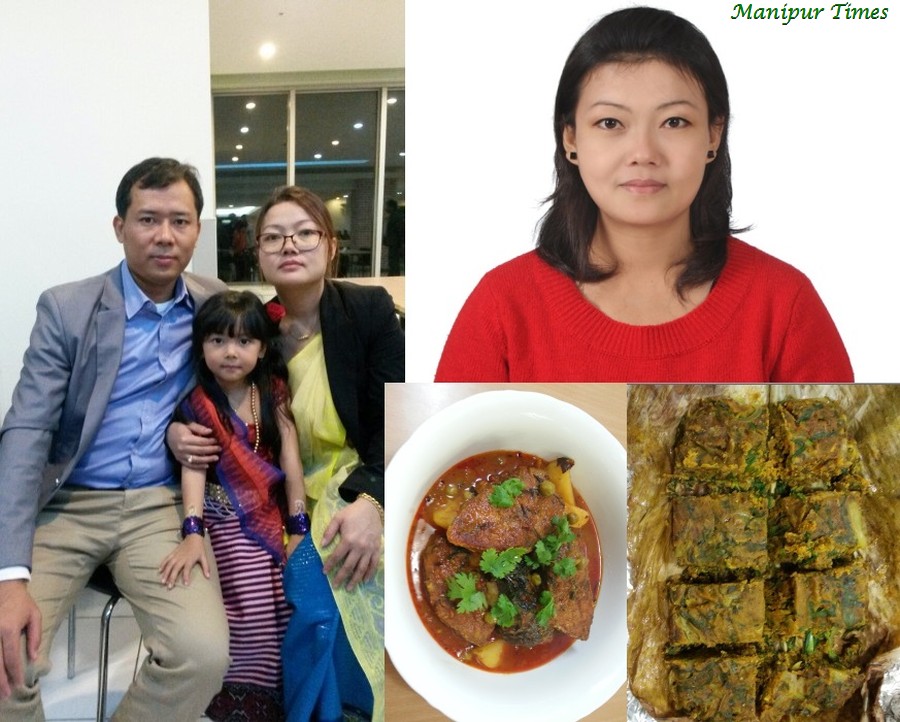 “Becoming a good cook can be a talk of the town. The best cook from the tiny kitchen has many advantages.” Said Premi. Longjam Ningol Nahakpam Ongbi Premi who is presently working as English Teacher in South Korea married to Nahakpam Bidhan, Assistant Professor, hailing from Lamphel Sanakeithel and blessed with a lovely daughter. She added, “For one, you’ll never be bored. There is always something going on in a kitchen. You will always be trying to outdo yourself and cook the most memorable meal possible for your family and guests.”
“Becoming a good cook can be a talk of the town. The best cook from the tiny kitchen has many advantages.” Said Premi. Longjam Ningol Nahakpam Ongbi Premi who is presently working as English Teacher in South Korea married to Nahakpam Bidhan, Assistant Professor, hailing from Lamphel Sanakeithel and blessed with a lovely daughter. She added, “For one, you’ll never be bored. There is always something going on in a kitchen. You will always be trying to outdo yourself and cook the most memorable meal possible for your family and guests.”
{gallery}MT-Stories/2014/20140131-Premi/Personal{/gallery}
Photos: Personal and Family
Premi was born in Saiton, Bishnupur district, and grew up in a large family where the culture of food was a staple in and of itself. However, Premi was found herself rarely in the family’s kitchen and could not spend time in cooking place during her childhood. She studied at D.M. Arts, Imphal and after graduating from the college, she moved to New Delhi for her higher studies. She was very unlucky till that time as she had no change to put a hand on cooking since she stays in the girl’s hostel during her study in Delhi. She studied Mass communication there at Delhi and M.A. (English) in Korea.
Early Days with Bad Cooking Skills
After her study, she eventually made the decision to work and began to stay in working hostel, which has a small convenient kitchen. In 2003 she started cooking from “rice” at the first time. Unfortunately, the rice does not come up in the desirable form. Failure was a great experience to her and it gave an instinct to stick with the cooking and thus started to lay her hands to become a good cook. Premi mentioned that she loves cooking and cooking is one of her hobby which always makes her remain happy. And as she is the last apple of her family, she always remains out of kitchen, which was always occupied either by her mom or two sisters, or later on with two sister-in-laws. When she enters the kitchen everyone in the family took her by surprise and did not consider about her cooking abilities. There were times when her family members even mocked her by saying that, “if you cook you are going to spoil the day’s supper.” Thus she had very rare opportunities to cook while she was with her family.
Exploring the Possibilities of the Art of Cooking
“Try the possibility to apply your creativity on a daily basis, the lifelong learning and prospects of advancement and you have all the ingredients for becoming a great cook. Try not to down your keen cooking skill in your free time,” said Premi. She always encourages who loves cooking. Cooking or cookery is an art or practice of preparing food for those who loves cooking. Cooking techniques and ingredients vary widely across the world, reflecting unique environmental, economic, and cultural traditions. A long history of society or civilization always wears the ingredients of cooking. So every different society has its own food habit like culture and it would not be mistaken to say that food habit is a part of culture.
Premi cooks authentic/traditional Manipuri dishes for her family who continues to prove her skill and accessibility not only with her expanding presence beyond her expectation but also with the great success of her cook dishes in social gatherings as well. Premi’s cooking started in the small working hostel’s small kitchen in 2003 when she started working as well as exploring new taste like “morok metpa” and some “dal curry” in a daily life to survive. Since then, there was no looking back for her and thus, she has learned and has become better cook. And during this period, her friends’ circles among Manipuri friends grew more and occasionally met and eat together, a very common phenomenon for Manipuris. Every weekend she laid her hands on new dishes to explore healthy and satisfying authentic Manipuri dishes like “Chagem-pomba, Utti, Paknam” and so on.
{gallery}MT-Stories/2014/20140131-Premi/Mathels{/gallery}
Photos: Several Mathels cooked by Premi
It became a routine to cook everyday and exploring new dishes at every opportunity available. Whenever, she has lack of confidence or confused to cook, she always calls up her mother or sisters and took their help (a kind of online help). Apart from her mother, her elder sisters and sister-in-laws are very good at cooking and it was under their guidance and inspiration that she moved forward in cooking and her cooking still remains in exploring new tastes. “Numerous tips from my parents could help to become a better cook. I really appreciate all the remarks of my family who gave their time and effort,” said Premi.
Managing Manipuri authentic dishes in South Korea
Responding to MT on Manipuri food items in South Korea, Premi enthusiastically said that it was not an easy decision to move to a new country, leaving and giving up her present life and job in New Delhi. However, they took the decision to move to South Korea following her husband’s job. A Far East country, where there are only some few similar food one could find out, though completely different in cooking style. The first few months in Korea were difficult for her, as she was alone home, when her husband was away for his duties. She had no choice but explore new things, among which “cooking” was one. During the first half year, they had only few “ngari’ to supplement their Manipuri appetite and others they had to rely on locally available varieties. Among them which they ate most was imported Thai “tin-fish” or “sardines”. Those foods could not stand for long; they were fed-up of eating it. During the summer break, they had the opportunity to visit home for more than a month. And during the visit, they prepared many things to be carried to South Korea. They dried many vegetables, fruits, and left no chance to miss anything.
With those dried foods in hands, it was a different experience from then. Once arrived in Korea, they had abundant Manipuri food items in stock. Therefore, almost every day she cooked Manipuri dishes. They also eat outside occasionally and explored Korean dishes, and among their favourite Korean dishes were “Tak-Galbi” or grilled chicken with vegetables and Korean sauces.
{gallery}MT-Stories/2014/20140131-Premi/Varieties{/gallery}
Photos: Varieties of food Items brought to Korea from Manipur
Slowly, she adapted to the Korean environment and explored more Korean foods. Though they were completely adapted to Korean food then, they never missed the ingredients of Manipur. Apart from cooking Manipuri food, she also started exploring cooking Korean food items. Apparently she joined some Korean cooking classes and learnt how to cook some their foods. Now she is almost confident in cooking some varieties of Korean dishes, namely “Tuenjang Jige, Kimchi Jigae, Samgye-tang, Kalguksu” to name some.
Every time they visit home, they make sure that they bring enough Manipuri food items. Whenever they travel, 90% of their luggages were full with those (traditional Manipuri food) items, which can meet their demands for months (even years). She also started kitchen gardening in and around their house and started planting some few vegetables. As Korean do not eat coriander leaves, it was not very common to find it in the local mart/supermarket. Either they got it from the Chinese store or Asian marts. So, she tried her hands on these types of vegetables. She planted coriander leaves, Maroi Nappakpi, Tunigkok, Pakhon, Sebot, Yendem, Awa-phadigom, U-morok, Hawai-mubi etc. and it all comes out well. Therefore, they relished their Manipuri foods with those vegetables from her kitchen garden.
{gallery}MT-Stories/2014/20140131-Premi/Mana-masing{/gallery}
Photos : Kitchen Garden
Recipes of several indigenous foods of Manipur as prepared by Premi will be introduced the upcoming Chakhum channel of Manipurtimes.












Proud of you sis n bro in low
I like it….
Ayaaa…. Chaoram me chan chan se…
Where u r in Manipur or in south pole or any in other corners of the world… Whatever the food parents offers to their children will continue to be their children favorite dishes… Generation to generation the cooking tradition will pass on….. So nothing special about this article….its common business for all n everyone who stay outside Manipur…
I love paknam
Chaothokchei south Korea da leibiridu adubu North na kapsinlaktu toklarani beranihe
Good job
Now us will attack you. ..cos u stay there. ..
South Korea ga US ga enemy oiday hey
North Korea ganay
Good
Hi….
i liked the page manipur times to get news of manipur becoz i belong to mainland so i want to know what is going on i think you guys should filter news and write on wall
Meitei ningol good
Wow we proud of you
Dear admin, this is all you have cooked for the day. Pls also add some similar incidents from local communities in parallel to compensate the news and demographic paradigms. Keep it up.
?
Nga thongba asiga paknam asiga ubada tin yotle. Healthy food su oihallamgani khalli.